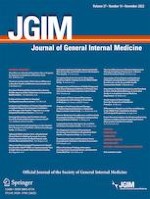Published in:

28-01-2022 | Mood Disorders | Original Research
Prevalent Multimorbidity Combinations Among Middle-Aged and Older Adults Seen in Community Health Centers
Authors:
Ana R. Quiñones, PhD, Steele H. Valenzuela, MS, Nathalie Huguet, PhD, Maria Ukhanova, MD PhD, Miguel Marino, PhD, Jennifer A. Lucas, PhD, Jean O’Malley, MPH, Teresa D. Schmidt, PhD, Robert Voss, MS, Katherine Peak, MPH, Nathaniel T. Warren, MPH, John Heintzman, MD
Published in:
Journal of General Internal Medicine
|
Issue 14/2022
Login to get access
Abstract
Background
Multimorbidity (≥ 2 chronic diseases) is associated with greater disability and higher treatment burden, as well as difficulty coordinating self-management tasks for adults with complex multimorbidity patterns. Comparatively little work has focused on assessing multimorbidity patterns among patients seeking care in community health centers (CHCs).
Objective
To identify and characterize prevalent multimorbidity patterns in a multi-state network of CHCs over a 5-year period.
Design
A cohort study of the 2014–2019 ADVANCE multi-state CHC clinical data network. We identified the most prevalent multimorbidity combination patterns and assessed the frequency of patterns throughout a 5-year period as well as the demographic characteristics of patient panels by prevalent patterns.
Participants
The study included data from 838,642 patients aged ≥ 45 years who were seen in 337 CHCs across 22 states between 2014 and 2019.
Main measures
Prevalent multimorbidity patterns of somatic, mental health, and mental-somatic combinations of 22 chronic diseases based on the U.S. Department of Health and Human Services Multiple Chronic Conditions framework: anxiety, arthritis, asthma, autism, cancer, cardiac arrhythmia, chronic kidney disease (CKD), chronic obstructive pulmonary disease (COPD), congestive heart failure, coronary artery disease, dementia, depression, diabetes, hepatitis, human immunodeficiency virus (HIV), hyperlipidemia, hypertension, osteoporosis, post-traumatic stress disorder (PTSD), schizophrenia, substance use disorder, and stroke.
Key results
Multimorbidity is common among middle-aged and older patients seen in CHCs: 40% have somatic, 6% have mental health, and 24% have mental-somatic multimorbidity patterns. The most frequently occurring pattern across all years is hyperlipidemia-hypertension. The three most frequent patterns are various iterations of hyperlipidemia, hypertension, and diabetes and are consistent in rank of occurrence across all years. CKD-hyperlipidemia-hypertension and anxiety-depression are both more frequent in later study years.
Conclusions
CHCs are increasingly seeing more complex multimorbidity patterns over time; these most often involve mental health morbidity and advanced cardiometabolic-renal morbidity.